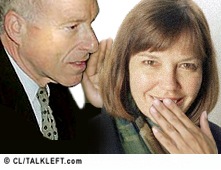Fitzgerald did a crisp and clean direct examination, taking only 40 minutes to go through her career, how she hooked up with Libby, their meetings, her legal fight over being subpoenaed, her 85 days in jail, and her two subsequent grand jury appearances. Judy and Fitz were like a well-oiled machine. Unlike Ari who played to the jury, Judy directed her answers to Fitz, occasionally turning to the jury to explain a term, but then returning her attention to Fitz. The jury hung on to every word.
For the whole story, read Marcy Wheeler's great live-blogging. Shorter version: She met with an agitated, frustrated Scooter Libby on June 23, 2003. Libby complained to her about Joseph Wilson, whom he called "that clandestine guy," and Wilson's attack on the Administration's WMD claims, which he called "an irrelevant ruse." During this off-the-record meeting, Libby told her Wilson's wife worked in "the Bureau" which at first she interpreted as being the F.B.I., but then figured out he meant the C.I.A. and its non-proliferation division.
They met again on July 8, spending two hours in the dining room of the St. Regis hotel. Libby again was agitated. They had a wide-ranging discussion on the intelligence leading up to the war, and Libby asked her to not to mention him, but to attribute his statements to a former Hill staffer. He told her Joseph Wilson's wife worked at the CIA's WINPAC, the unit focused on WMD's.
She spoke to Libby twice on the phone on July 12. He didn't tell her where he got the information about Valerie Wilson and they had no discussions about whether her status was covert. Fitz then took her through her legal fight to avoid testifying which she said was the result of her not having received a personal, voluntary waiver from Scooter. As soon as she did, and as soon as Fitz agreed to limit her questioning to the topic of Libby, Wilson and Plame, she agreed to testify. The day after leaving jail, she went before the grand jury and told them about the July 8 meeting and July 12 calls, but had forgotten the June 23 meeting. That night, she found notes of the June 23 meeting, had Bennett call Fitz, and returned to the grand jury to describe that meeting in detail, her memory having been refreshed by her notes.
Judy, you see, has a note-triggered memory. She can forget an event even happened, but upon finding notes that it did, she remembers not only the event itself but details beyond those contained in the notes. Until she found those notes, she had zero recollection of having met with Libby on June 23, let alone what he told her. Once she reviewed her notes, she regained her independent memory of the meeting, Scooter's demeanor and his disclosures about Joseph and Valerie Wilson.
Enter Libby lawyer Bill Jeffress. He's a little guy, but a dynamo. Focused, no nonsense, polite but firm and pressing. He challenged Judy again and again on her selective memory, eliciting answers like, "I don't remember what I remembered then" and "Counselor, I already said, I didn't remember it, I just didn't remember it." Yet, she's now sure Libby told her about Wilson's wife working for the CIA. It's not that she was repeating what was in her notes, she said, it's that her notes brought back her independent memory.
Jeffress, being a skilled lawyer, began to test her credibility on her note-triggered memories. And that's what brought the trial to a standstill. She told him that she had no memory of discussing Valerie Plame Wilson before her June 23 meeting with Libby. He introduces a paragraph from an affidavit she signed, in which she mentions other sources for information related to Wilson's July 6 New York Times op-ed. Jeffress wants to know whether she can remember who those sources were and if so, he's going to ask her to identify them. Sidebar after sidebar results.
This isn't about the First Amendment, it's about Libby's right to impeach Miller's credibility, Wells argues. Fitz says asking her about sources related to the op-ed as opposed only to sources of information about Valerie Plame Wilson and her employment is too broad and not relevant to the case. Bennett weighs in. They go back and forth, and I'm nodding my head in agreement with each of them as they argue opposite sides. The Judge leans toward Fitz's position but is clearly concerned about not wanting to infringe on Libby's 6th Amendment right to confront and impeach Miller.
Judy by this time is clearly frustrated and anxious. She's repeatedly sorting her bangs, blowing her nose and taking sips of water. Finally, the Judge says he's going to sleep on it and he'll have an answer in the morning.
It's going to be a long night for Judy Miller. In the end, I think the Judge will split the baby, telling Jeffress he can ask about her other sources for information about Joseph and Valerie Wilson, but not other sources for the broader topic of everything in Wilson's July 6 oped.
What's the best that can happen for Libby? That the jury will conclude Miller's memory is so unreliable and selective they can't trust any of it. The worst? That some of the jurors will recognize themselves in Judy's account of her note-triggered memory. I know I do.
Matthew Cooper will follow Judy Miller. He and his lawyer were at the courthouse, waiting in the wings today, relieved I think they had another day before facing what's sure to be a grueling grilling by Jeffress.
(Jeralyn Merritt blogs daily at TalkLeft: the Politics of Crime.)




